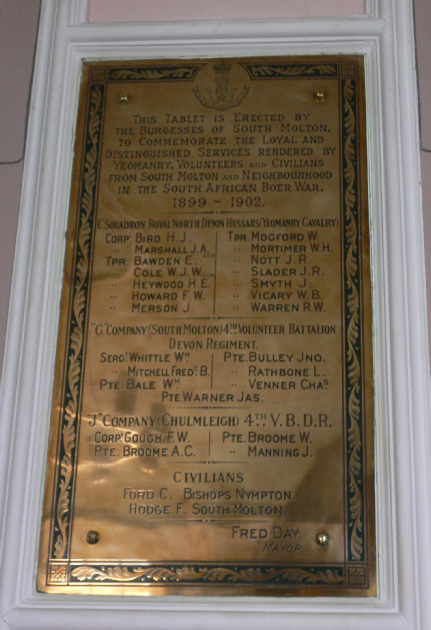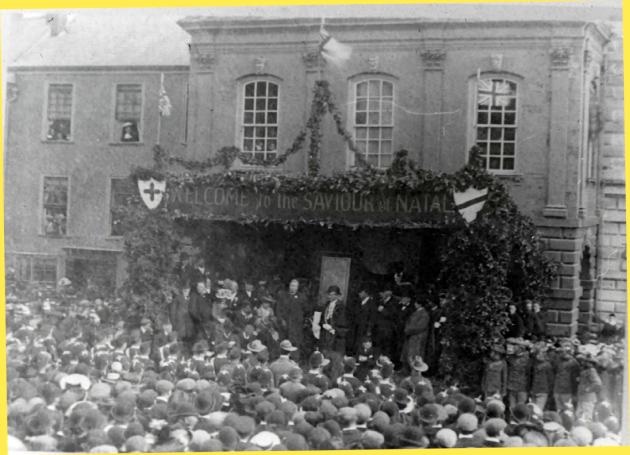
South Molton and The Boer War – 1899-
The following articles were extracted from The South Molton Gazette and North Devon Journal during the early 1960s by E. J. Kingdon, retyped by Shirley Bray April 2008.
The Boer War – October 14th 1899
The Transvaal Crisis -
General Sir Redvers Buller, commanding the First Army Corps, and the members of his staff, leave by the Dunottar Castle from Southampton today.
The Boer War – October 28th 1899
News from the seat of war is still being anxiously sought after, and as the papers and telegrams arrive they are eagerly scanned by one and all.
The fact of the First Devons leading the attack against the enemy has been the cause of much local interest, and their splendid bravery has been the talk of the week, “Good Old Devons” resounding from hundreds of voices.
The Boer War – Saturday January 20th 1900
Never in the history of the Volunteer Movement in South Molton, now some 25 years
since its formation, has there been such a display of loyalty and patriotism as that
which took place on Tuesday evening, the occasion being the Annual Dinner in connection
with the “G” South Molton Company of the 4th Battalion, Devonshire Regiment. Although
some twenty members of the “G” Company have volunteered for service at the Front
only four or five have been finally selected as complying in every respect with the
stringent regulations and requirements of the War Office. The names of the selected
men are:-
Sergeant Whittle, Private John Bulley, Private W. Bale, Private C. Venner, Private J. Warner.
The departure of the South Molton Volunteers had a very enthusiastic send off. At the Station there was an immense crowd to witness the departure and the proceedings were of the most enthusiastic character. “Soldiers of the Queen” was sung and the train steamed out of the Station amid vociferous cheers from a thousand voices. Thus ended one of the most stirring events that have occurred in South Molton within living memory.
The Boer War – March 3rd 1900
Receipt of the news that Ladysmith had been relieved in South Molton
Such an outbreak of loyalty, enthusiasm and gladness which took place on Tuesday on receipt of the joyful news has never been witnessed in the annals of the history of South Molton. Immediately on hearing the news people rushed out into the streets conveying one to the other the glad tidings. The Bugle Band paraded on the streets with a large crowd, the portrait of General Buller being conspicuous.
An impromptu meeting was held in the Market. A Committee was formed, consisting
of the Mayor, Aldermen and Council, and some co-
The 1st March, 1900 is a day that will be long remembered in the loyal and ancient borough of South Molton.
The following was one of the hymns that were sung throughout the day:-
We love our dear old homeland, and we love South Molton too;
We are going to beat the Boers soon, You will see if that’s not true.
You know we’ve taken Kimberley, and Ladysmith’s quite well,
And Kruger, poor old gentleman, will have a sadder tale to tell.
We are merry little people, brave Britishers and true,
And while Buller drives those Boers back, we’ll just say this to you.
Three cheers for the “Greek” and the “Manchester Merchant”,
Three cheers for our Devon boys too,
Three cheers for our Queen and Country,
Three cheers for the Red, White and Blue.
NOTE – I (E. J. Kingdon) understand that the “Greek” and the “Manchester Merchant” were the ships which conveyed the Devonshire Regiment to Africa. There was news at one time that one of them was sunk, but it proved to be untrue.
The Boer War – Saturday June 15th 1901
A right good hearty welcome was accorded to the Volunteers who returned home to their native town on Monday evening from the War. The town presented a good and attractive appearance, flags and bunting being displayed in honour of the occasion. It is intended shortly to further laud and honour the loyal and patriotic volunteers, as well as their comrades who were invalided home and the members of the Local Imperial Yeomanry who have returned from the front, at a public dinner, when it is hoped that some tangible recognition of their arduous service will be made to each member. Mr. F. Merson has generously subscribed £5 towards the fund.
South Molton has been singularly fortunate; six volunteers went out from the town and all have returned safe and sound.
The Boer War – June 15th 1901
The long anticipated return of the three out of the six volunteers from the “G” Company, 4th V.B.D.R., who have been on active service in the South African Campaign for the past eighteen months, was realised on Monday evening.
The Town Crier let it be known to the inhabitants that the men would arrive on the 9 p.m. train at South Molton Station. To the strains of the band of the Volunteers, under the leadership of Bandmaster E. Courtney, playing “When Johnny comes marching Home”, the procession wended its way to the railway station, accompanied by hundreds of townspeople. As the train came in view, cheer after cheer was raised and, as it approached the station, a number of fog signals was discharged. Amid the firing of cannon the men alighted on the platform which had been decorated with flags, etc., the band playing “See the conquering heroes come”. The men, who looked well bronzed, were in excellent health and received hearty congratulations from their relatives and friends on their safe return.
The procession was reformed and the gallant warriors headed the Volunteers. All along the road cheers were given, and on emerging into East Street the scene was one which will not quickly be forgotten. From lofty windows handkerchiefs were waved and everyone was anxious to see the men who had so gallantly and loyally answered the call to duty. On arriving in the Square the procession drew round a brake, into which the Mayor ascended amid loud cheers. When order had been restored His Worship said that, on behalf of the inhabitants of the ancient and loyal borough, he extended to them a hearty greeting on their return, and as far as he could judge by their appearance, not only safe but sound after their arduous campaign in South Africa – Cheers! They had given proof, if proof were required, that the men of Devon could fight as well now as they could three hundred years ago in the reign of Queen Elizabeth, and that Devon as a county was second to none in England in patriotism.
Brass Tablet erected in the Court Room of the Town Hall and unveiled by General Buller in 1903
General Buller’s visit to South Molton in 1903

